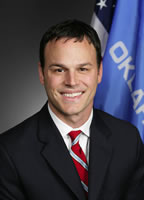Bill to Include Veterans in State's O-EPIC Program Approved
 Sen. Andrew Rice
Sen. Andrew Rice
As many as 26,000 Oklahoma veterans are uninsured, but that could soon change thanks to the efforts of State Sen. Andrew Rice. The Oklahoma City Democrat’s legislation, Senate Bill 59, was unanimously approved Wednesday by the Senate Appropriations Committee.
“This is an issue that can’t be ignored any longer. Most people believe that veterans automatically qualify for free health care, but they don’t. Many make too much to qualify for Medicaid or means-tested VA care, but don’t make enough to pay for private insurance,” said Rice. “It’s shameful, we have men and women who have risked their lives for our country who don’t have adequate access to healthcare, but hopefully we can get this problem fixed this session.”
Senate Bill 59 would expand the Oklahoma Employer/Employee Partnership for Insurance Coverage Program (O-EPIC), also known as the Insure Oklahoma program, to include certain qualified veterans. Veterans would be included under the Individual Plan of the program, which currently provides coverage to more than 5,200 Oklahomans.
“These individuals deserve our utmost respect for their service. Our words and actions often fall short in conveying our tremendous gratitude to our veterans,” said Rice. “I think the least we can do for them is ensure that they have adequate health care. The costs that would be incurred to the state cannot even be compared to the sacrifices of our soldiers.”
Like other participants in the Individual Plan, veterans would pay a portion of their monthly premiums based on their annual household income. For individuals, this can be up to $51 or around $69 for an individual and a spouse.
In order to qualify, a veteran would have to be an Oklahoma resident between the ages of 19 and 64 with a household income no greater than the sum of an amount equal to 25 percent of the federal poverty level or an amount equal to the federal Veterans Health Administration means test income threshold when entering the program. The person could not be on active duty or have been dishonorably discharged from service. The individual would also have had to been uninsured for at least six months unless the person lost coverage because his or her military post-active duty benefits expired or the individual lost his or her employee-sponsored plan due to being laid off or the employer no longer offered the benefits.
 Oklahoma Senate
Oklahoma Senate

